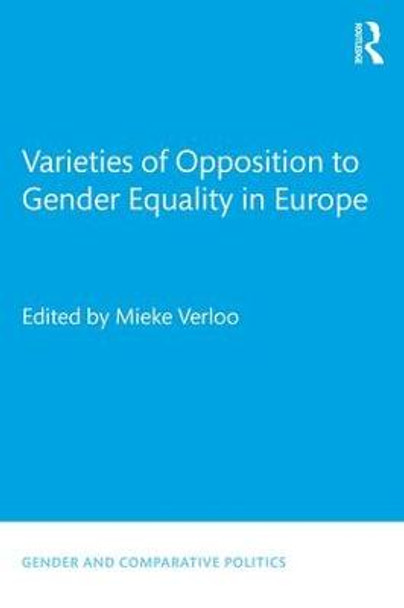Description
In contrast to the wealth of studies on progress towards gender equality, opposition to gender equality is rarely studied, which makes it difficult to understand the positive and negative dynamics of gender equality as a political project.
The first of its kind, this timely collection examines the potential and challenges of our current scholarship on understanding opposition to gender+ equality in Europe. Divided into three parts, Mieke Verloo and her team of international experts begin Varieties of Opposition to Gender Equality in Europe by theorizing the dynamics of opposition to gender equality policies in Europe. Part Two highlights oppositional actors (politicians, governments, citizens, policy makers, churches) and political arenas (parliament, courts, Internet), as well as different and opposing visions of gender+ equality. Part Three concludes with a framework for understanding oppositional dynamics on gender equality change.
Setting the agenda for future research, this book will be useful for students of gender and politics, social movements, European integration, and policy studies, as well as for high-level policymakers, students, and feminist activists alike. It will be an inspiration to thinkers and doers and to scholars and political actors.
About the Author
Mieke Verloo is Professor of Comparative Politics and Inequality Issues at Radboud University in the Netherlands, and Non-Residential Permanent Fellow at the IWM, Institute for Human Sciences, in Vienna. She is the winner of the 2015 ECPG Gender and Politics Career Achievement Award. She was scientific director of large research projects on gender equality policymaking in Europe that designed methods to analyze the various meanings of gender equality policies across Europe, as well as their intersectional dimensions. She has extensive consultancy and training experience on gender mainstreaming and intersectionality for several European governments and institutions. Her latest research is on the rise and dynamics of opposition to gender+ equality in Europe.
Reviews
'This truly timely book fixates "opposition to gender equality" as an acute research priority. It deplores the fragmented state of our understanding yet makes great amends, scrutinizing varieties of opposition to equality through a series of strong case studies from different parts of Europe. The book's ambition is huge and very much appreciated: It launches a brand new theory-grounded research program of great significance for gender+ equality scholarship in the years to come. An extremely important book!' - Hege Skjeie, Professor of Political Science, University of Oslo, Norway
'When hundreds of protesters in Poland, France, and Italy are protesting against "gender ideology"; when the erosion of democratic institutions, as is happening in Hungary, becomes a matter of political reality; and radical right political parties are on the rise in Europe, the crucial question is: what went wrong? This excellent collection provides important answers in the context of gender+ equality policies, which have been one of the main target of these illiberal political changes. While gender+ equality policies have always faced opposition, this well-researched book not only shows that we are facing a new chapter in this oppositional project but also offers analytical and theoretical tools to counter its complex dynamics. For this reason, this volume is an indispensable and crucial read not only for scholars, but also for activists, politicians, and anyone fighting for social justice.' - Roman Kuhar, University of Ljubljana, Slovenia
'We need to understand why opposition to gender equality is growing in Europe. With its superb range and innovative analysis, this book will inspire new thinking and new practices in response to this trend.' - Sylvia Walby, Distinguished Professor of Sociology and UNESCO Chair of Gender Research, Lancaster University, UK
'Building on social movement theory and social complexity theory, this book offers an original framework for understanding the varieties of opposition to the project of gender equality in Europe. The empirical chapters support the key conceptual points: that opposition to gender equality is dynamic, multi-dimensional, intersectional, and influenced by context-specific factors. The innovative framework contributes to an understanding of how the rise of opposition forces to gender equality is closely linked to class and an understanding of how to counter these oppositional forces. The book convincingly argues that future analysis of opposition to gender equality needs to focus more on intersectionality, especially regarding race and ethnicity.' - Birte Siim, Professor, Department of Culture and Global Studies, Aalborg University, Denmark
Book Information
ISBN 9781138649613
Author Mieke Verloo
Format Paperback
Page Count 238
Imprint Routledge
Publisher Taylor & Francis Ltd
Weight(grams) 340g









